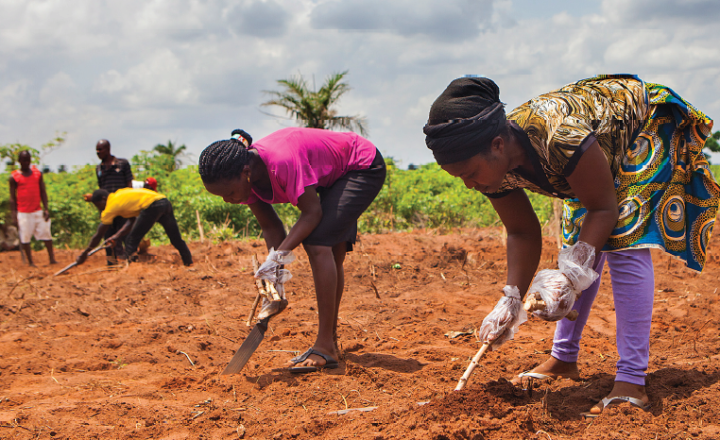BY EMMANUEL NGENEGBO
The National Register of Farmers in Nigeria was updated five years ago, and one may wonder how the federal government has been implementing most of its agricultural interventions when the basic tool for developing strategic interventions and policies is outdated and largely unreliable.
Data is a paramount tool which is both strategic and pivotal for the development of the agricultural sector. Where data is lacking, it simply means that the federal government activities in the agricultural sector will fail to be inclusive in capturing the main beneficiaries for any interventions by the government. The use of reliable and up-to-date data not only provides the government with the particulars of our indigenous farmers, their locations and what they cultivate, but it also provides a platform upon which informed decisions are made, which is essential for policy planning and service delivery.
As already mentioned, there are profound implications for a robust database or registry of farmers in Nigeria and small-scale women farmers stand as the highest losers from this data deficit. These small-scale women farmers make up more than 60 percent of the population of smallholder farmers in Nigeria and have been continuously marginalised largely due to the failure of the government to capture their numbers.
Advertisement
The last comprehensive update of the national farmer database was conducted over five years ago, according to findings from the policy brief on small scale women farmers and research innovations developed by the Centre for Social Justice (CSJ), the Small Scale Women Farmers Organisation of Nigeria (SWOFON), and the Agricultural Research Council of Nigeria (ARCN). In that time, countless women have joined the agricultural workforce, yet remain invisible to the data systems that determine access to government support.
The reason for this consistent shortfall in data is not far-fetched – there is no centralised registration portal or platform for farmers in Nigeria. The agriculture ministry and different agencies of agriculture and economic development all have their own database. Their data collection systems and registrations are largely unharmonised, leading to fragmented and duplication of data. This is also coupled with the fact that available data is not gender responsive to show sex, age, farming scale and location of these farmers.
The recurring consequences of this sustained data insufficiency are that many smallholder farmers, especially women, miss out on agricultural inputs and subsidies organised by the government. These government interventions, due to the absence of robust data, develop their activities on assumptions rather than empirical data, which in most cases fail to reach the proposed beneficiaries.
Advertisement
The government hardly runs specific gender responsive interventions and generalises activities as gender neutral interventions. Women’s needs are generally marginalised, and with the non-availability of gender friendly farm equipment, their productivity level is mostly impeded. Development agencies and credit-leaning company Bank of Agriculture rely on official data to identify eligible beneficiaries, smallholder farmers, especially women. These groups, who are hardly registered, are largely ineligible or find it difficult to access credit facilities and insurance to boost their farming activities. An agricultural research institute whose mandate is to research and create innovations tailored to farmers’ needs may miss out on the priority or needs of these small-holding women farmers due to the deficiency of data; the aggregate disadvantage of reliable data is therefore devastating, with far-reaching implications.
It is therefore imperative to establish and sustain a robust, comprehensive gender disaggregated national farmers registry. This system should be carefully collated to reflect the sex, location, age and speciality of these small holder farmers – this will also compute their technology use, literacy level and training needs.
To achieve this, the federal ministry of agriculture and food security should implement and prioritise the collection and harmonisation of farmer data along with all the relevant agencies collecting data on agriculture, like the Bureau of Statistics and the Central Bank of Nigeria. The national identity system can be used to get a wider reach, and organisations like the All Farmers Association of Nigeria, which are already collating data of farmers, can be incorporated into the collection processes to ensure transparency in the exercise.
Technologies such as mobile-based surveys, GIS mapping, and biometric registration can make farmer identification more efficient and transparent. Once this is achieved, the data can be deployed to agricultural planning, budgeting, monitoring and other government interventions in agriculture across all levels of government.
Advertisement
If Nigeria is to attain food security and agricultural transformation, priority should be placed on these smallholder farmers. They must be visible, and this visibility can only come with the right and reliable data. The era of politicking data for personal gains while neglecting the real beneficiaries is no longer sustainable; this is both a moral and economic emphasis.
Nigeria must fully include, acknowledge, and back the key players in the agricultural sector – that is, farmers and more especially women farmers to realise the potential of its rural economy. By ensuring their contributions are counted, agricultural programs will be more effective. The core principle holds: in farming and in government, we can only manage what we measure; what we ignore will be neglected.
Emmanuel Ngenegbo writes for the Centre for Social Justice
Advertisement
Views expressed by contributors are strictly personal and not of TheCable.


